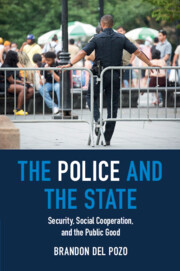Book contents
- The Police and the State
- The Police and the State
- Copyright page
- Contents
- Introduction
- Chapter 1 The Role of the Police
- Chapter 2 The First Power of the Police
- Chapter 3 The Second Power of the Police
- Chapter 4 The Third Power of the Police
- Chapter 5 Democratic Priorities, Relationships, and Tensions
- Chapter 6 The Bases of, and Reasons for Seeking, Police Legitimacy
- Chapter 7 Procedural Justice in Policing Revisited
- Chapter 8 Policing with Public Reason
- Chapter 9 Policing Populism, Protecting Pluralism
- Chapter 10 Primary Goods, Policing States in Transition, and Natural Experiments
- References
- Index
Chapter 8 - Policing with Public Reason
Published online by Cambridge University Press: 17 January 2023
- The Police and the State
- The Police and the State
- Copyright page
- Contents
- Introduction
- Chapter 1 The Role of the Police
- Chapter 2 The First Power of the Police
- Chapter 3 The Second Power of the Police
- Chapter 4 The Third Power of the Police
- Chapter 5 Democratic Priorities, Relationships, and Tensions
- Chapter 6 The Bases of, and Reasons for Seeking, Police Legitimacy
- Chapter 7 Procedural Justice in Policing Revisited
- Chapter 8 Policing with Public Reason
- Chapter 9 Policing Populism, Protecting Pluralism
- Chapter 10 Primary Goods, Policing States in Transition, and Natural Experiments
- References
- Index
Summary
This chapter argues that policing can be justified at its various levels (e.g., strategic, transactional) utilizing the requirement of Rawlsian public reason, wherein the reasons supplied for coercive government decisions that take up basic matters of justice must be ones that all citizens can access and evaluate from positions of equality. It uses the highly publicized arrest of two Black men for trespassing at a café in Philadelphia to illustrate the concern that procedural justice without public reason can yield troubling outcomes, especially when our intuitions tell us the reasons motivating the procedural transaction do not apply equally to all citizens (e.g., concerns of trespass in a café in a wealthy neighborhood would not apply equally to all citizens based on race, no matter how scrupulously the police employed Tyler’s procedural justice in response to the trespass allegations). While a public reason approach to police justification is a process that would not rule out the subjective judgments police make in complex and evolving situations, it would provide an adequate basis for evaluating overall resource allocations, and more importantly set a high expectation of reason giving grounded in equality as police make lower-level discretionary judgments.
Keywords
- Type
- Chapter
- Information
- The Police and the StateSecurity, Social Cooperation, and the Public Good, pp. 162 - 191Publisher: Cambridge University PressPrint publication year: 2022



